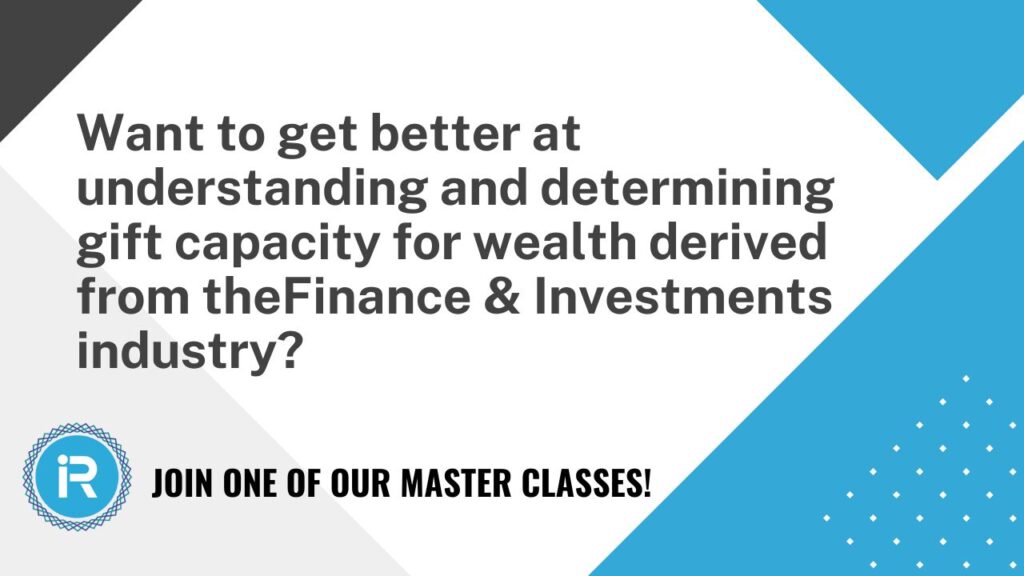Finance Industry Series Part 5 of 5
How you, the prospect research professional, write up your prospect profile affects the eventual solicitation – especially when it comes to complex prospects in the financial field. Do you find that difficult to believe? Or are you nodding your head right now and feeling validated? And if you are a development officer, isn’t it incredibly helpful when you don’t need a dictionary and Wikipedia to understand what’s in the profile? Of course it is!
I get it. As a fundraising research professional you want to be accurate. You prefer having a source to cite and a formula to generate a value. But researching people and professions has never been as simple as working through a checklist – and never will be.
Following are two suggestions for getting GREAT at presenting prospects in the finance industry (or any prospect really) to your organization.
Consider shifting your perspective with three desired outcomes for profiles.
Understanding
Ensure that your writing provides a clear understanding of your prospect and all that entails. If your prospect is co-owner of a venture capital firm, write that information as if your teenager was reading the profile. You aren’t writing this profile to get a grade in a university course. You want to be sure your development officer (and anyone that reads the profile) really understands the prospect.
Strategy
As Anne Hofmann wrote in her piece for Apra Connections in 2019, use the framework of “What? So what? Therefore.” to provide the reader of your profile with why and how the information you are presenting matters to the engagement, cultivation, and solicitation of this prospect. This takes practice. As always, if you can elicit feedback from your development officer about your efforts you will get better faster.
Confidence
When the development officer is finished reading your profile, will s/he have the confidence to move forward? There are always factors outside of your control, but if you have written for understanding and provided strategic guidance the answer should be YES to confidence!
Consider saving your best language and updating regularly.
Sage advice from prospect research guru Christina Pulawski is to save examples of your “best” profiles. This works because it demonstrates the holistic evaluation of an individual or household.
When it comes to complex professions, I recommend you also save the specific language in a style guide format. No, you can’t just cut and paste the language into a profile and never blink an eye. As always, one must review and revise in the context of the specific person you are researching, but it will refresh the neuron connections in your brain about that specific profession.
Because at Aspire, we don’t research venture capitalists every day. And every day our brains focus on a wide variety of clients, prospects, and professions. Having some “anchor” language helps a lot.
Following is an example of our current language for venture capitalists. We keep updating our standard language to make it easier to understand and yet retain accuracy and relevance.
Venture capital firms are private equity firms focused on early-stage investing, but not as early as angel investors. Venture capital firms raise money for funds they create. The funds don’t receive investment money all at once and don’t usually invest it all at once. Similarly, an investor’s money is then usually locked into the fund for a period of around five to ten years.
The funds invest in companies according to their described fund strategy. These investments are expected to mature when there is either an initial public offering (IPO) on the public stock exchange, a merger or acquisition of the company, or a recapitalization (e.g., the company gives the fund back its money through cash earned in growth or through financing).
Venture capitalists such as NAME likely earn money in multiple ways:
- The private equity firm charges the funds an asset management fee, which ranges from 1% to 2% depending upon the fund.
- When the fund exits its investments and there is a profit on the investment, the firm charges a fee on that profit called “carried interest,” which is often 15% to 20%. It is subject to minimum fund return thresholds and might not be paid in full if in previous years the fund suffered a loss.
- NAME is likely to have some of his/her own money invested in one or more funds and would earn the profit on his/her investment in addition to any fee sharing s/he is entitled to.
NAME has a potential $M equity interest in the firm’s funds based on the total assets under management (AUM) currently.
Build your own confidence — by practicing in a safe environment.
I have been in prospect research for about twenty years now. You might think I would feel very confident about my ability to explain venture capital in a profile. And yet, posting Aspire’s standard language publicly still feels very risky, very exposed. One of you out there could no doubt do it better?
But as I tell my granddaughter repeatedly, if you want to learn or get really good at something, it is very important to make mistakes. Making mistakes is fundamental to learning!
This is a core reason I created the Prospect Research Institute. I wanted to create a safe space to practice – and make mistakes.
You have two options for learning and practicing at the Institute:
- FREE Institute Forums: You can create a free account on the forums and participate in Master Class homework, even if you don’t purchase a Master Class. For example, this is the Venture Capital Prospect in USA – Homework.
- Purchase a Course or Master Class: Courses are on-demand for 12 months and you can attend Group Coaching Calls and get homework feedback. Master Classes are all about discussion on a particular topic – these are not webinars!
When it comes to learning and practicing research on complex professions such as in the finance field, check out the Master Classes at the Prospect Research Institute today — and sign up for one that fits what you need to learn.
Finance 5 Blog Series
- Top of the Wealth List: Finance and Investments? | Finance Industry Series: Part 1 of 5 | Jennifer Filla Blog | 2023
- Alternative Investments: Sophistication Required | Finance Industry Series: Part 2 of 5 | Jennifer Filla Blog | 2023
- The Simple Way to Spot Million-Dollar Donors In Your Database | Finance Industry Series: Part 3 of 5 | Jennifer Filla Blog | 2023
- Affinity First Or ‘Why Is My Prospect Not On The Forbes List?’ | Finance Industry Series: Part 4 of 5 | Jennifer Filla Blog | 2023
- Can you really turn words into bigger gifts? Yes! | Finance Industry Series: Part 5 of 5 | Jennifer Filla Blog | 2023

